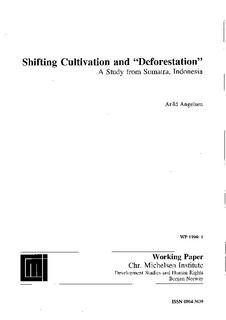Shifting Cultivation and "Deforestation". A Study from Sumatra, Indonesia
Working paper
Permanent lenke
http://hdl.handle.net/11250/2436009Utgivelsesdato
1994Metadata
Vis full innførselSamlinger
- Bora-import [434]
Sammendrag
About half of tropical deforestation is commonly explained by the expansion of traditional agriculture (shifting cultivation). This article first questions the share of responsibly assigned to traditional agriculture. Secondly, a simple framework based on a theory of land rent capture is developed to explain agricultural expansion. The framework is applied in the study of recent changes in shifting cultivators' adaptations in a lowland rainforest area in Sumatra, Indonesia. Increased rubber planting and expansion into primary forest are seen as a response to increased rubber profitability and (expected) land scarcity, and as a race for property rights. Government land claims have been important in initiating a self-reinforcing land race, and have therefore significant multiplier effects on forest clearing.
Utgiver
Chr. Michelsen InstituteSerie
CMI Working paperWP 1994: 1
